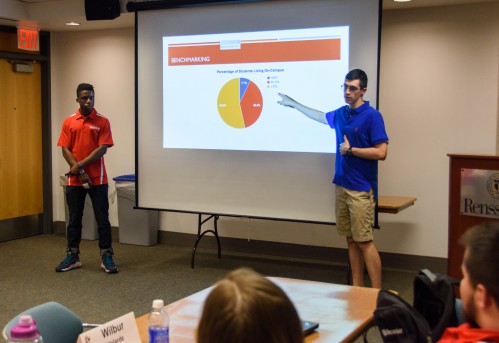 PAUL ILORI ’17 AND HARRISON LEINWEBER ’18 SPEAK before the Senate about research that the Student Life Committee has performed into the topic of dorm access.
PAUL ILORI ’17 AND HARRISON LEINWEBER ’18 SPEAK before the Senate about research that the Student Life Committee has performed into the topic of dorm access.At the beginning of the Student Senate meeting on March 9, Victoria Tong ’16 told the Senate that the Rules & Elections Committee would not be presenting the Grand Marshal Week 2016 Handbook and that they were looking into electronic voting.
Justin Etzine ’18 asked how this would affect GM Week campaigning, to which Tong replied that R&E would likely need to push back the dates listed in the handbook.
Senators proposed solutions and workarounds to the approval issue, including forms of electronic voting and bylaw amendments; however, the issue was not dealt with until later during new business.
The Student Life Committee report, Chairman Paul Ilori ’17, along with Vice-Chairman Harrison Leinweber ’18, gave a presentation on their progress of expanding residence hall access.
Leinweber was the original creator of the Allow Students to Key into All Entrances of their Hall petition last year and has worked with SLC to find solutions.
Universal access was granted in 2013, allowing students to access all residence halls with their RPI ID, and was revoked in December 2014 following a series of residence hall break-ins.
When universal access was revoked, students were concerned that restricting door use would create more problems than it solved. Personal safety and inclement weather were the main concerns.
SLC benchmarked a number of other schools of varying sizes to determine the best way to proceed. Common solutions included installing cameras, security guards, and self-locking doors.
Graduate student Benjamin Walcott asked about costs of the proposed solutions, to which Ilori explained that costs were intentionally left to the institute since it would ultimately come from their budget.
Sidney Kochman ’19 pointed out that security cameras would create a privacy issue, as someone could gain unauthorized access to the footage.
Etzine suggested using the RFID system that is currently in place to monitor who swipes into a dorm and record how long a door is open to determine if that person allowed a piggybacker.
While some senators liked the idea of having self-locking doors, Keegan Caraway ’18 said that he knows some people who lived with self-locking doors and that they opted to leave them propped open all of the time to avoid accidental lock-outs. This would defeat the purpose.
The suggestions from the Senate will be taken into consideration by SLC and will return to the Senate with an improved proposal.
During new business, the issue of voting on the GM Week Handbook was raised. A motion to amend the Senate bylaws as to allow electronic voting was brought to the floor by graduate student Mike Caiola and seconded by graduate student Tim Krentz.
Etzine condemned electronic voting, saying that it “sets a bad precedent because the voting of the meeting isn’t very open” and that there is potential for several loopholes.
Graduate student Mike Caiola felt the opposite, saying that the motion was just to vote, not to hold a meeting, and that the parliamentarian would publish the results of the vote.
After looking into Roberts Rules of Order, Joshua Rosenfeld ’16 found that Robert’s Rules require “one general area” or “the same room” for a vote, and suspending Robert Rules would cause more issues than amending the Senate bylaws.
To respond to Etzine, Grand Marshal Marcus Flowers ’16 said that the Executive Board does electronic voting through email and there has been no backlash.
President of the Union Nick Dvorak ’16 was brought in to explain the E-Board’s voting process. He stated that they only go to electronic vote if the issue cannot be brought up during a regular meeting. Additionally, electronic voting can be overturned by a one quarter vote.
The motion to amend the Senate bylaws to allow for electronic voting through email was approved 18-1-7.
The second half of new business involved the GM Week Handbook, during which Tong told the Senate that the current Rules and Elections members are new this year and that they overestimated their ability to finish the handbook on time.
A motion to electronically vote from March 16 to March 18 was created and passed 17-1-0. The meeting recessed until March 16 so as to allow voting to occur.
At the conclusion of the voting on March 18, Rosenfeld emailed the Senate the following statement:
“I have tallied the results for the electronic vote on the GM Week Handbook 2016. We have passed the deadline for voting defined by the motion to vote electronically, and following the procedure for valid votes that I defined as per my duties in the Senate Bylaws, Article III, Section 7, the result of the vote is not valid. We did not obtain the required quorum of 18 valid votes for the vote on the motion to be valid. As such, the result of the vote is null and void.”
15 senators voted in favor, two voted against, none abstained, and nine failed to respond.
At the time of publishing, the public voting record, as commissioned by the electronic voting procedures, was not yet posted on Flagship Docs.
Flowers called an emergency meeting for Sunday, March 20, 8:15 pm, but was unable to call the meeting to order due to a lack of quorum.
